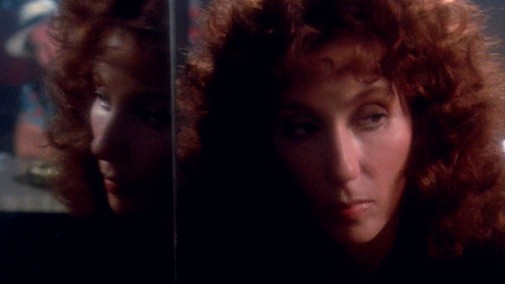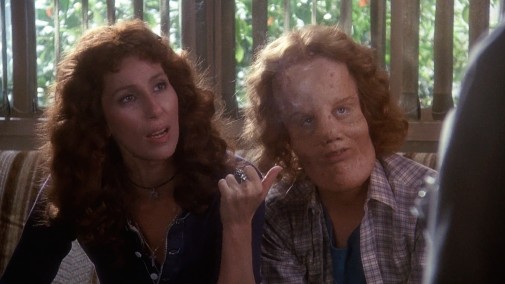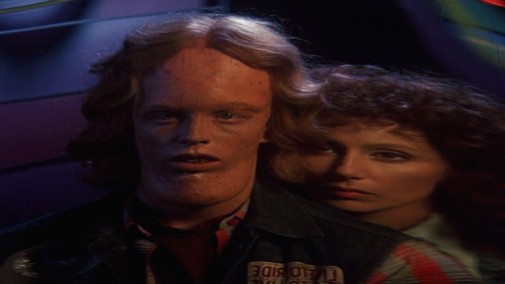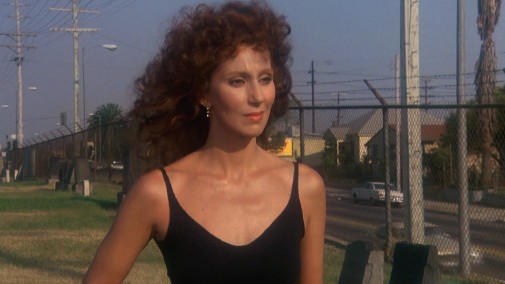
To commemorate Cher's 75th birthday, I'm dedicating this week's "Almost There" to a celebration of the superstar. For someone who gained fame as a singer and TV personality, Cher's an acting powerhouse. Over the years, she has amassed a small but impressive filmography. In 1985, after proving her dramatic abilities in supporting roles, directed by Robert Altman and Mike Nichols, Cher got her first leading part in Peter Bogdanovich's Mask. She wowed critics, filmgoers, and festival juries worldwide, and many predicted her for a Best Actress Oscar nomination. Even Cher herself seemed to believe she deserved the honor. Unfortunately, AMPAS disagreed…

Based on a true story, Mask tells the tale of Roy L. "Rocky" Dennis, a boy with craniodiaphyseal dysplasia, also known as lionitis. Despite many ominous prognostics dating back to his infancy, Rocky managed to grow up into his teenage years, living a relatively regular existence until his death at 16. Focusing on the last months of his life, Mask portrays the teen's high school misadventures as well as Rocky's relationship with Rusty, his biker gang single mother afflicted with a drug problem, blessed with a bullheaded no-nonsense attitude. Covered in extensive prosthetic makeup, Eric Stoltz takes on the role of Rocky while Cher embodies Rusty like a complicated hurricane of abrasive motherhood.
One of Mask's greatest assets is its reluctance to paint the main characters with broad strokes, often acknowledging their qualities while allowing the shadows of their imperfections to enter the picture. When the film starts, it isn't easy to look at Rusty as anything else than a luminous presence, with Cher exuding enough radiant movie star charisma to turn the night into day. With a cloud of curly hair that could be alternatively described as a lion's mane or an oxidized halo, Cher's Rusty dominates every moment she's on-screen while never breaking the naturalistic spell of the proceedings. Her magnetism feels organic, so tightly woven into the character's essence, that we can't discern where movie magic ends and honest humanity begins.


Brassy and loud, though never strenuously so, Cher plays the scenes at school and the hospital as an over-protective defender of her child. Watching her maneuver through the comedic possibilities of the scenes with earthy dryness reminded me of Julia Roberts in Erin Brockovich, only even more disarmingly grounded and effortlessly funny. It would be easy to let Rusty's unwavering love for her kid overshadow any other characteristic intrinsic to the text, but Cher is careful with her maternal affections and affectations. The stubborn dismissiveness with which she cajoles those who stand in her kid's path can just as quickly be directed towards Rocky himself.

When he excitedly recites a poem written for class, she doesn't listen to it with the rapt attention of a saintly woman. Instead, she continues to do her business around the house, barely acknowledging the aching sincerity of her child's words. It's a vexing decision, unassuming in its meanness, but it adds a beautiful complexity to Rusty's cinematic persona and sets the stage for familial discord. Mask never indulges in simple one-dimensional emotional tones despite the schmaltzy possibilities inherent to this story of disability and young death. In real life, nobody's entirely a hero or villain, so neither are Rusty or Rocky. She's cool as hell and tough as nails. She's also an addict, capable of neglect, cruelty too.
The ultimate success of the film's many actors is how they thread the line between authenticity and alienation, trusting their audience will feel for the characters because of their honest messiness and not despite it. This is never more apparent than in the moments when mother and son quarrel, fight and break each other's hearts as they do it. Cher allows an undercurrent of perpetual irritation to bubble over in these scenes, the strength of the strong mother quickly morphing into the sharp mercilessness that comes with anger. Her sculptural features and big eyes make for a gorgeous movie mechanism, equally able to project compassion and steeliness, warmth, and glacial coldness.


Her fury has interesting dimensions as well. We can see that Rusty knows when she goes too far, like when she tears one of Rocky's precious baseball cards. The mulish expression is full of vengeful intent wavers, though we can glimpse regret. When gazing at an old flame, there's fear interlaced with spite, the flame of desire dimmed by aching vulnerability. While she's often thought of as a singer first and foremost, Cher's astoundingly nimble when it comes to playing silent reaction shots. It's difficult to forget the bittersweet awe with which Rusty contemplates her son's distorted reflection, the ebullient pride at his academic success, the hazy shame of druggy lethargy, the paralyzing fear that manifests whenever Rocky's body shows signs of giving in, giving up, giving out.


Because of Bogdanovich's downplayed empathy, the crew's understanding that Rocky's ailment is a part of his life but not the entirety of him, and the cast's anti-sentimental approach, Mask rises above a tricky premise and delivers one hell of an emotional wallop. As the final chapters of Rocky's life arrive, Cher's asked to perform an overwhelming cocktail of despair and maternal perseverance, but not even then does she abandon the strategy of avoidance when it comes to cheap sentiment. Every tear she wins from her audience is valiantly earned, her pain always tempered by impotent rage, by immense strength. In one show-stopping sequence, Cher goes through the many stages of Rusty's grief, allowing us to see how her character survives the loss of her son, how she lives through what no mother should ever have to endure.

Mask premiered at the 38th Cannes Film Festival, where it won the Best Actress prize for Cher. It was a tie, as she shared the honor with Norma Aleandro for The Official Story, another thespian who'd earn much buzz during the awards season but would fail to win over the Academy. Cher was nominated for the Golden Globe alongside her costar Eric Stolz, though neither won. When Oscar nomination morning arrived, Mask only got a Best Makeup nod, a prize it would end up winning. As for the Best Actress lineup, it was composed of Anne Bancroft in Agnes of God, Whoopi Goldberg in The Color Purple, Jessical Lange in Sweet Dreams, Geraldine Page in The Trip to Bountiful, and Meryl Streep in Out of Africa.
Page would triumph after seven unsuccessful Oscar bids, winning the statuette a bit over a year before her untimely death. Of the five nominees, it's fair to say Bancroft and Lange were the most vulnerable. Neither of their flicks got much love outside the acting categories, with Lange not having any precursor nomination to recommend her. While I think both Cannes champions deserved spots on the Oscar lineup, it's not a bad quintet of performances by any means. In a gesture of provocation, Cher showed up at the Academy Awards in an outrageous Bob Mackie creation, mocking the Academy for not considering her a respectable actress. She'd get her "revenge" two years later when she won the Best Actress Oscar for Moonstruck.

Unfortunately, Mask isn't streaming anywhere at the moment. If you want to watch it, you might consider getting the DVD or Blu-Ray. The film's worth the trouble.